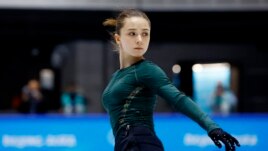14 February 2022
Russian figure skater Kamila Valieva has been cleared to compete in the women's individual competition at the Winter Olympics in Beijing, China.
The 15-year-old failed a drug test six weeks before the Olympics. Results from the test came back last week.
The women's figure skating competition begins Tuesday and ends Thursday. Valieva is considered a gold-medal favorite in the event. If she does finish in the top three, however, Valieva will not get a medal ceremony in Beijing. Nor will any skater who finishes in the top three with her.

Kamila Valieva of the Russian Olympic Committee in action during training on February 14, 2022. REUTERS/Evgenia Novozhenina
The Court of Arbitration for Sport cleared Valieva to skate Monday afternoon Beijing time. A group of three judges ruled that Valieva does not need to be temporarily suspended from competition before a full investigation takes place.
The court gave her a favorable decision in part because she is a minor, or a "protected person," and is subject to different rules from an adult athlete.
"The panel considered that preventing the athlete to compete at the Olympic Games would cause her irreparable harm in the circumstances," CAS Director General Matthieu Reeb said.
The International Olympic Committee said Monday afternoon that if Valieva finishes in the top three, there will be no medal ceremony during the Games. There also will be no ceremony for the team event won by Valieva and the Russian team a week ago.
"It would not be appropriate to hold the medal ceremony," the IOC said.
The decision not to award medals also affects the men's Olympic champion, Nathan Chen, and the rest of the American figure skating team. The United States finished second behind the Russian Olympic Committee (ROC). They will leave Beijing unsure if they won silver or gold. If Valieva and the ROC do not get to keep their gold medal, Japan moves up to silver and Canada wins bronze.
Shortly after the CAS ruling, Valieva was seen practicing as her trainer watched. She completed her program without a fall, drawing quiet cheers from the Russian media watching.
Reaction around the world included support for the young skater as well as anger that Russian doping had once again damaged a sporting event. Athletes from Russia are competing in this Olympics as the ROC as a punishment for past doping. Medal winners from Russia do not see their national flag raised or hear their national song.
In addition to Valieva being a minor, the CAS ruling noted issues of fairness, the fact that she tested clean in Beijing, and that there were "serious issues" with how long it took to get the results of her positive test.
Valieva tested positive for the heart drug trimetazidine on December 25 at the Russian nationals. However, the result from a Swedish lab did not come until a week ago, after she helped the Russian Olympic Committee win the team gold.
It is not clear why it took six weeks to get the results from the lab in Sweden. In a statement, the World Anti-Doping Agency suggested that Russia's anti-doping agency made a mistake by not telling the Swedish lab that Valieva's test needed to be completed ahead of the Olympics.
RUSADA suspended Valieva last Tuesday after it received the results from the lab. The medal ceremony for the team event was then suspended because of the young skater's failed drug test.
RUSADA lifted the ban a day later. The International Olympic Committee and other groups appealed, and an urgent hearing was held Sunday night. Valieva took part in the hearing over video.
Athletes under 16 like Valieva have more rights under anti-doping rules. They are not always held responsible for taking banned substances. The focus of any future investigation will be on her trainers, doctors and other adults who are responsible for her health and safety.
This ruling only concerned whether Valieva can keep skating before her case is completed. It did not deal with whether she and the Russian Olympic Committee can keep their first-place position in the team event.
Those issues will be dealt with in a separate, longer-term investigation led by RUSADA.
The World Anti-Doping Agency will have the right to appeal any ruling by RUSADA, and also said it wants to independently investigate Valieva's team.
I'm Caty Weaver.
The Associated Press reported this story. Ashley Thompson adapted it for VOA Learning English.
---------------------------------------------
Words in This Story
athlete - n. a person who is trained in or good at sports, games, or exercises that require physical skill and strength
circumstance - n. a condition or fact that affects a situation
appropriate - adj. right or suited for some purpose or situation
practice - v. to do something again and again in order to become better at it
doping - n. the illegal use of a drug (such as a steroid) to improve an athlete's performance
positive - adj. showing the presence of a particular germ, condition, or substance
focus - n. showing the presence of a particular germ, condition, or substance